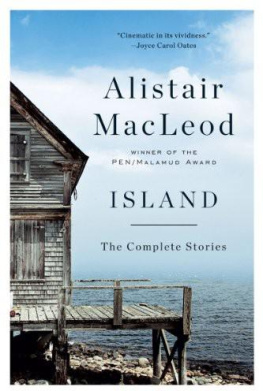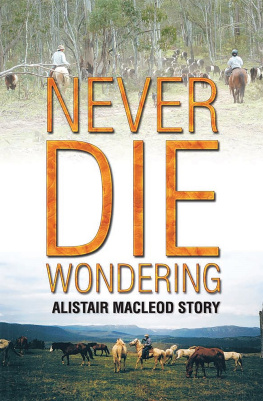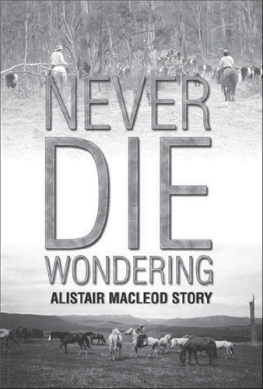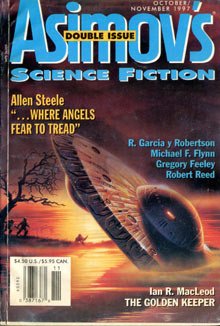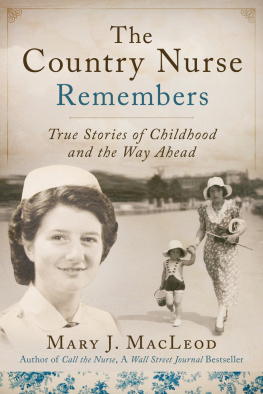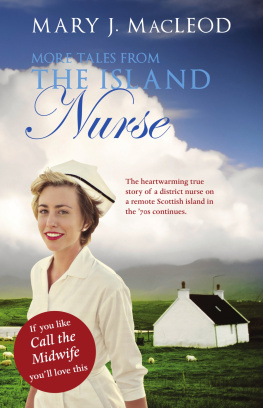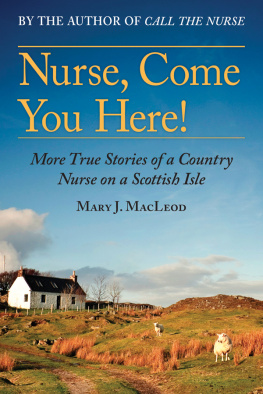

A L I S T A I R
M A C L E O D
ISLAND
The Complete Stories
W . W . N O R T O N & C O M P A N Y
New York London
Copyright 2000 by Alistair MacLeod
First American edition 2001
Originally published in Canada under the title Island: The Collected Short Stories ofAlistair MacLeod
All rights reserved
Printed in the United States of America
For information about permission to reproduce selections from this book, write to Permissions, W.W Norton & Company, Inc., 500 Fifth Avenue, New York, NY 10110
The text and display of this book are composed in Bembo Manufacturing by the Haddon Craftsmen, Inc.
Library of Congress Cataloging-in-Publication Data MacLeod, Alistair.
Island : the complete stories / Alistair MacLeod.1st American ed.
p. cm.
ISBN 0-393-05035-1
1. Cape Breton Island (N.S.)Fiction. 2. ScotsCanadaFiction.
I. Title.
PR9199.3.M3342 A6 2001
813'.54dc21
00-051524
W.W. Norton & Company, Inc.
500 Fifth Avenue, New York, N.Y. 10110
www.wwnorton.com
W.W. Norton & Company Ltd.
Castle House, 75/76 Wells Street, London W I T 3QT
3 4 5 6 7 8 9 0
ISLAND
The Complete Stories
Contents
"The Boat" (1968) 1
"The Vastness of the Dark" (1971) 2
"The Golden Gift of Grey" (1971) 59
"The Return" (1971) 79
"In the Fal " (1973) 98
"The Lost Salt Gift of Blood" (1974) 118
"The Road to Rankin's Point" (1976) 143
"The Closing Down of Summer" (1976) 180
"To Every Thing There Is a Season" (1977) 200
"Second Spring" (1980) 218
"Winter Dog" (1981) 249
"The Tuning of Perfection" (1984) 271
"As Birds Bring Forth the Sun" (1985) 310
"Vision" (1986) 321
"Island" (1988) 309
"Clearances" (1999) 413
Acknowledgements 433
O T H E R B O O K S B Y A L I S T A I R M A C L E O D
The Lost Salt Gift of Blood
As Birds Bring Forth the Sun
No Great Mischief: A Novel
E D I T O R ' S I N T R O D U C T I O N
Alistair MacLeod's short stories have gained him a world-wide audience. They have appeared in every English-speaking country and have been translated into many other languages, including Italian, Norwegian, Gaelic and Urdu. T h e stories, included in two books shaped with patient care, The Lost Salt Gift of Blood (1976) and As Birds Bring Forth the Sun (1986), led Carmen Callil and C o l m Toibm to include him in their selection The ModernLibrary: The 200 Best Novels in English Since 1950, and inspired the Irish novelist Toibin to say, "Reading these two books, knowing that I could tell other readers about them, was the high point of The Modern Library Project for me."
By 1999 the sixty-four-year-old university professor's reputation as a short story writer stood so high that his first novel, NoGreat Mischief was awaited with breathless anticipation. W h e n the book finally appeared, in September of that year, it was promptly hailed as a masterpiece, and became a Canadian bestseller. It also attracted eager publishers from many other countries.
In turn, the success of No Great Mischief has created a keen interest in Alistair MacLeod's short stories. This book is issued in response to that demand. All sixteen of his lovingly crafted stories are contained here, organized chronologically, in the order in which they first appeared in print. They are accompanied by no commentary, no explanations, no critical apparatus. These are Alistair MacLeod's stories, and they speak for themselves.
Douglas M. Gibson
January 2000
v
ISLAND
The Complete Stories

THE BOAT
(1968)
There are times even now, when I awake at four o'clock in the morning with the terrible fear that I have overslept; when I imagine that my father is waiting for me in the room below the darkened stairs or that the shorebound men are tossing pebbles against my window while blowing their hands and stomping their feet impatiently on the frozen steadfast earth. There are times when I am half out of bed and fumbling for socks and mumbling for words before I realize that I am foolishly alone, that no one waits at the base of the stairs and no boat rides restlessly in the waters by the pier.
At such times only the grey corpses on the overflowing ashtray beside my bed bear witness to the extinction of the latest spark and silently await the crushing out of the most recent of their fellows. And then because I am afraid to be alone with death, I dress rapidly, make a great to-do about clearing my throat, turn on both faucets in the sink and proceed to make 1
A L I S T A I R M A C L E O D : ISLAND
loud splashing ineffectual noises. Later I go out and walk the mile to the all-night restaurant.
In the winter it is a very cold walk, and there are often tears in my eyes when I arrive. The waitress usually gives a sympathetic little shiver and says, "Boy, it must be really cold out there; you got tears in your eyes."
"Yes," I say, "it sure is; it really is."
And then the three or four of us w h o are always in such places at such times make uninteresting little protective chit-chat until the dawn reluctantly arrives. Then I swallow the coffee, which is always bitter, and leave with a great busy rush because by that time I have to worry about being late and whether I have a clean shirt and whether my car will start and about all the other countless things one must worry about when one teaches at a great Midwestern university. And I know then that that day will go by as have all the days of the past ten years, for the call and the voices and the shapes and the boat were not really there in the early morning's darkness and I have all kinds of comforting reality to prove it. They are only shadows and echoes, the animals a child's hands make on the wall by lamplight, and the voices from the rain barrel; the cuttings from an old movie made in the black and white of long ago.
I first became conscious of the boat in the same way and at almost the same time that I became aware of the people it supported. My earliest recollection of my father is a view from the floor of gigantic rubber boots and then of being suddenly elevated and having my face pressed against the stubble of his cheek, and of how it tasted of salt and of how he smelled of salt from his red-soled rubber boots to the shaggy whiteness of his hair.
THE BOAT
W h e n I was very small, he took me for my first ride in the boat. I rode the half-mile from our house to the wharf on his shoulders and I remember the sound of his rubber boots galumphing along the gravel beach, the tune of the indecent little song he used to sing, and the odour of the salt.
The floor of the boat was permeated with the same odour and in its constancy I was not aware of change. In the harbour we made our little circle and returned. He tied the boat by its painter, fastened the stern to its permanent anchor and lifted me high over his head to the solidity of the wharf. Then he climbed up the little iron ladder that led to the wharf's cap, placed me once more upon his shoulders and galumphed off again.
W h e n we returned to the house everyone made a great fuss over my precocious excursion and asked, " H o w did you like the boat?" "Were you afraid in the boat?" "Did you cry in the boat?"
Next page
